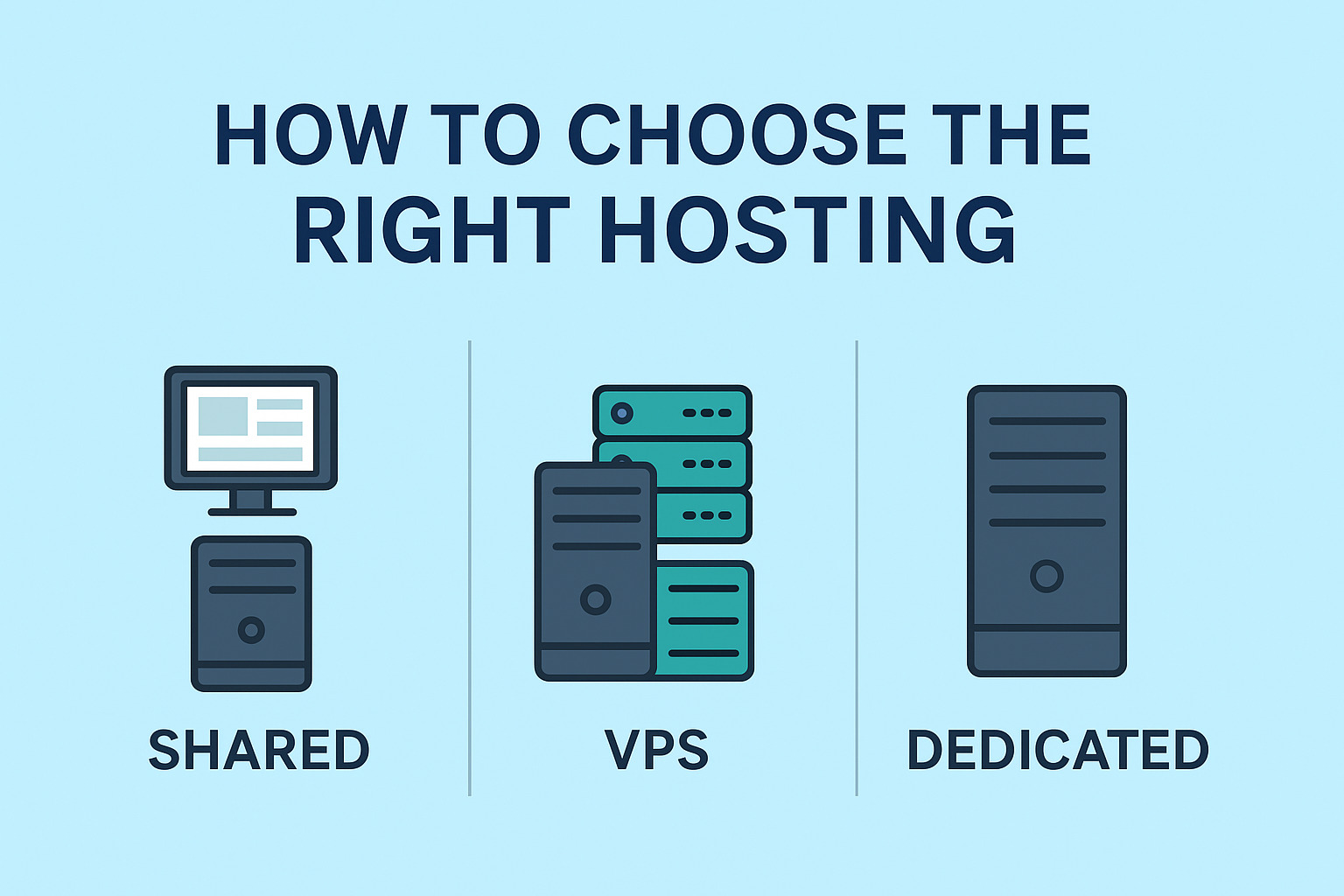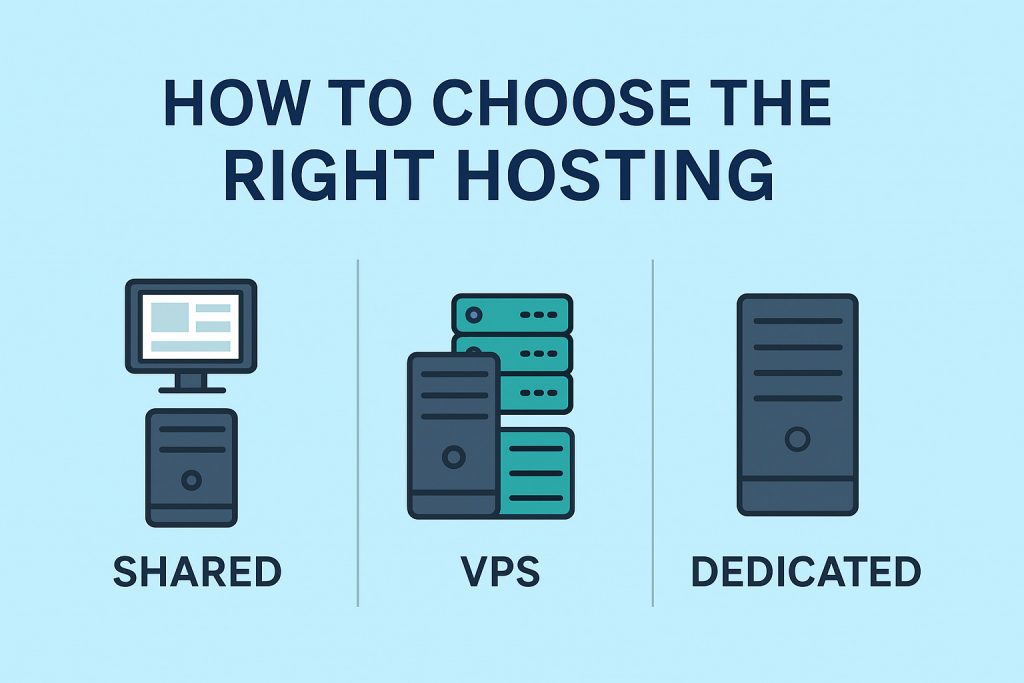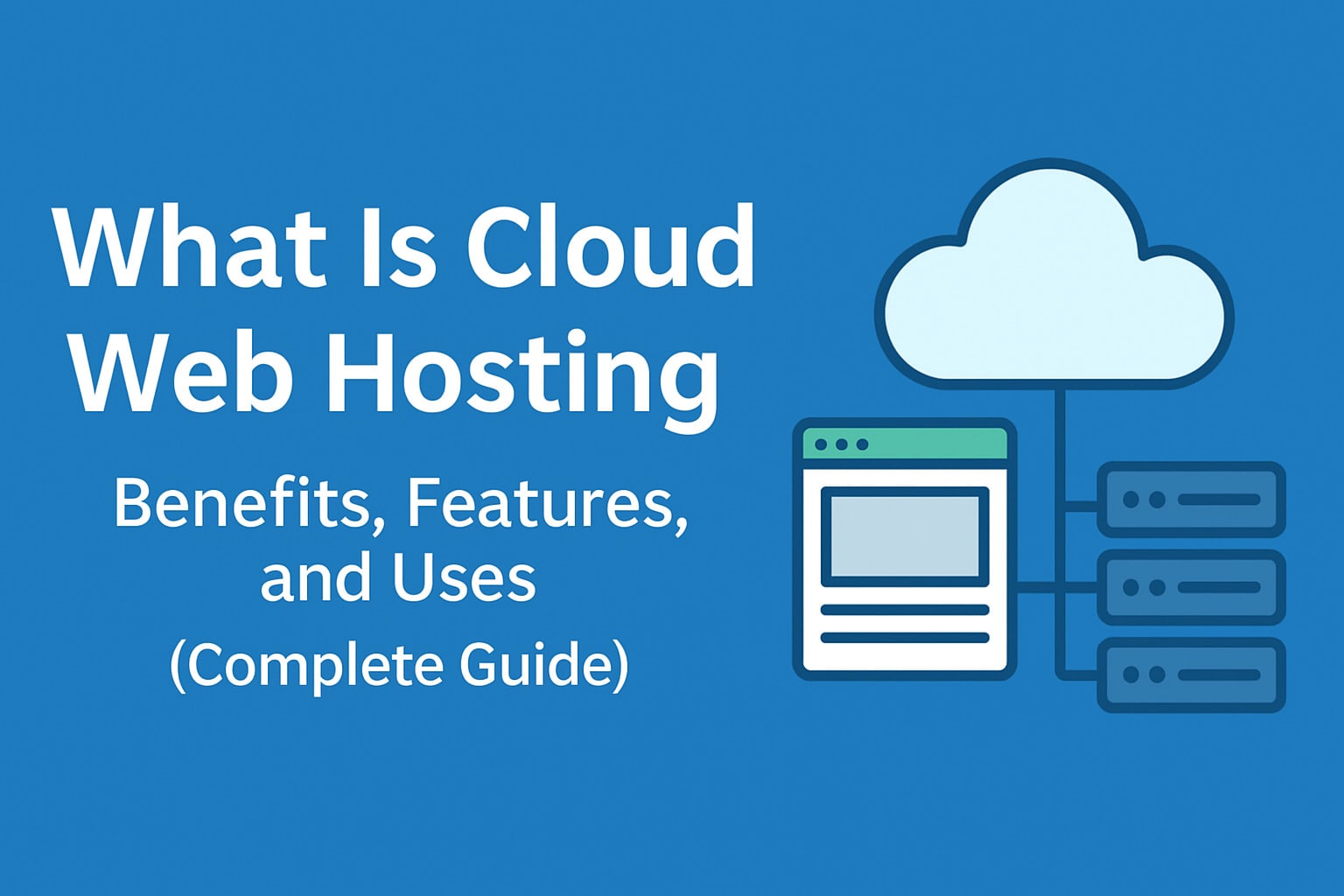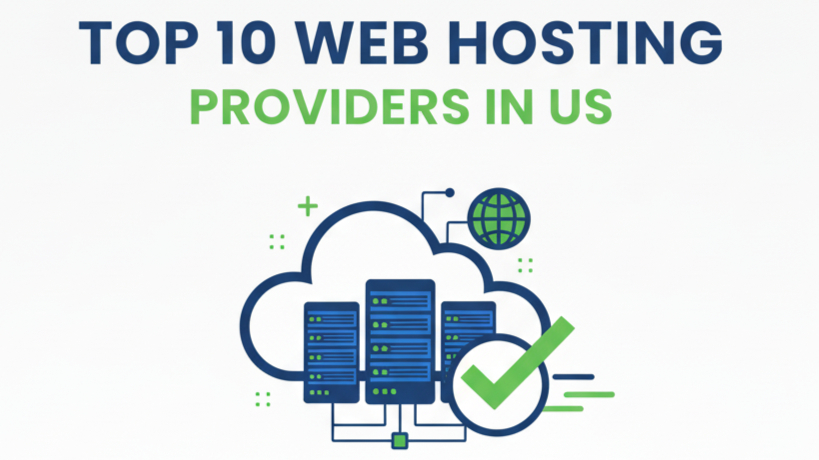Shared vs VPS vs Dedicated Hosting: How to Choose the Right Hosting for Your Website

- November 25, 2025
- 1 Comment

Choosing the right hosting plan is one of the most important decisions for any website owner. The hosting environment directly affects a site’s speed, uptime, security, scalability, and long term flexibility. Whether you are launching a personal blog, running an online store, or scaling a business application, understanding the difference between shared, VPS, and dedicated hosting will help you make a confident and future ready choice.
This in depth guide explains how each hosting type works, the key differences between them, real world performance expectations, pricing considerations, use cases, and how to choose the best option for your current and future needs.
What is Shared Hosting?
Shared hosting is the most basic and affordable hosting solution. In this setup, one physical server hosts many websites that share the same CPU, memory, storage, and bandwidth. The hosting provider manages the server, security patches, and updates, making it simple for beginners to get started.
Advantages of Shared Hosting
- Lowest cost hosting option
- Beginner friendly with no technical skills required
- Quick setup with control panels like cPanel or Plesk
- Managed environment with automated updates
Limitations of Shared Hosting
- Performance can slow down during heavy usage
- Limited control over server settings
- Not ideal for high traffic websites
- Higher security exposure due to multiple users
Best Use Cases for Shared Hosting
Shared hosting is suitable for:
- Personal blogs and portfolios
- Small business brochure websites
- Early stage projects and testing
- Sites with low and stable traffic
2. What is VPS Hosting
VPS stands for Virtual Private Server. It uses virtualization technology to divide a physical server into multiple isolated virtual machines. Each VPS has dedicated CPU, RAM, storage, and its own operating system environment, providing far better performance and control than shared hosting.
How VPS Hosting Works
A hypervisor such as KVM, VMware, or Hyper V allocates guaranteed resources to each virtual server. This means activity on other VPS instances does not affect your performance. Most VPS plans include root access for full control over software, security, and configuration.
Types of VPS Hosting:
Managed VPS Hosting
- The provider handles updates, patches, monitoring, and backups
- Suitable for users who want control without technical work
Unmanaged VPS Hosting
- Full responsibility for configuration and maintenance
- Ideal for developers and system administrators
Advantages of VPS Hosting
- Dedicated resources for consistent performance
- Higher reliability and stability than shared hosting
- Ability to scale resources as traffic increases
- Greater security and isolation
- Root access for custom configurations
Limitations of VPS Hosting
- Costs more than shared hosting
- Requires technical expertise if unmanaged
- Still shares underlying physical hardware
Best Use Cases for VPS Hosting
VPS hosting is ideal for:
- Growing business websites
- Medium size e commerce stores
- SaaS platforms and membership sites
- Developers running staging environments
- Websites expecting steady traffic growth
3. What is Dedicated Hosting
Dedicated hosting provides one entire physical server exclusively for a single user. No other accounts share the resources, making it the most powerful and secure traditional hosting option.
How Dedicated Hosting Works
Users lease the full server and can configure the operating system, software stack, security policies, and storage setup. Dedicated servers may include enterprise hardware, large memory capacity, RAID storage, and high speed network connections.
Advantages of Dedicated Hosting
- Complete access to all server resources
- Maximum performance and reliability
- Highest level of security and isolation
- Full customization of software and hardware
- Suitable for mission critical applications
Limitations of Dedicated Hosting
- Highest cost compared to other hosting types
- Requires advanced technical skills
- Scaling requires hardware upgrades or migration
- Setup time may be longer than VPS provisioning
Best Use Cases for Dedicated Hosting
Recommended for:
- High traffic enterprise websites
- Large e commerce platforms and marketplaces
- Applications handling sensitive or regulated data
- Media streaming and gaming servers
- Database intensive workloads
Comparison Table: Shared vs VPS vs Dedicated Hosting
| Feature | Shared Hosting | VPS Hosting | Dedicated Hosting |
|---|---|---|---|
| Resource allocation | Shared across many users | Dedicated virtual resources | Full physical resources |
| Performance level | Basic and limited | Stable and scalable | Highest performance |
| Security level | Moderate with shared environment risk | Strong isolation with custom controls | Maximum security and isolation |
| Control and customization | Very limited | Root access and advanced configuration | Full control including hardware |
| Scalability | Minimal upgrade room | Easy vertical scaling | Requires hardware upgrades |
| Ideal for | Small sites and beginners | Growing businesses and developers | Enterprise level and high traffic applications |
| Cost | Lowest price range | Mid range pricing | Highest cost |
Key Differences at a Glance
- Shared hosting is the most affordable but offers limited performance and control
- VPS hosting provides a balance of power, flexibility, scalability, and cost efficiency
- Dedicated hosting delivers the best performance and security for demanding workloads
Pricing Overview and Budget Planning
Typical pricing ranges across the hosting industry:
- Shared hosting between 2 dollars and 15 dollars per month
- VPS hosting between 5 dollars and 80 dollars per month depending on resources and management
- Dedicated hosting starting around 80 dollars and reaching several hundred dollars for advanced hardware
Always compare factors such as:
- Backup and recovery options
- Network bandwidth and data transfer limits
- Server location and latency
- Support response times
- Security features and DDoS protection
- Upgrade options without migration
Choosing the cheapest plan may appear cost efficient but often leads to performance and scaling issues later.
When to Choose Each Hosting Option
Choose Shared Hosting If
- Your website is small and lightweight
- Traffic levels are low and predictable
- You want an easy, low maintenance setup
- Budget is limited
Choose VPS Hosting If
- Your site has outgrown shared hosting
- You need faster performance and reliability
- You want custom configuration abilities
- You expect steady growth
- You run dynamic applications such as online stores or membership platforms
Choose Dedicated Hosting If
- You require maximum performance
- Your business handles sensitive or regulated information
- You need advanced security and customization
- You run high traffic enterprise applications
Migration and Upgrade Path
A smooth hosting progression usually follows this pattern:
Start with Shared Hosting
Ideal for launching new sites or testing ideas.
Upgrade to VPS Hosting When
- Page load times slow down
- Resource limit warnings appear
- Traffic increases
- You need custom software
Move to Dedicated Hosting When
- VPS resources reach full capacity
- Performance affects business operations
- Compliance requires strict isolation
- Specialized configurations are necessary
Planning ahead reduces downtime and cost during transitions.
FAQs – (Frequently Asked Questions)
Q1. Is VPS hosting more secure than shared hosting
Yes, VPS hosting provides stronger security because each virtual server is isolated. Shared hosting users share the same environment, which increases exposure if another account is compromised.
Q2. Can I upgrade from shared to VPS without downtime
Most providers support migration with minimal or zero downtime. Reducing DNS TTL and using staging tools helps ensure a smooth transition.
Q3. Is dedicated hosting necessary for e commerce websites
Not always. Many small and medium e commerce stores run successfully on VPS hosting. Dedicated hosting is recommended only when traffic, compliance, or performance demands exceed VPS capacity.
Q4. Do VPS plans always include root access
Most VPS providers offer root access, but some managed plans limit it for security and support purposes. Always check the plan details before purchasing.
Q5. How do I know when it is time to move to a higher hosting plan
You should consider upgrading when you notice slow performance, frequent resource limits, increased downtime, or new application requirements that the current environment cannot support.
You Might Also Like This:
- What Is Cloud Web Hosting: Benefits, Features (Complete Guide)
- Virtualization Software: A Complete Guide for Businesses
Final Thoughts
Choosing between shared, VPS, and dedicated hosting depends on your current needs and long term growth plans. Shared hosting is suitable for beginners and small websites, VPS hosting offers a powerful and scalable solution for growing businesses, and dedicated hosting provides maximum performance and security for demanding applications.
Evaluate your hosting based on traffic volume, performance expectations, security requirements, budget, and technical skill. Making the right decision early ensures faster performance, improved reliability, and a better user experience.




Comments
What Is Cloud Web Hosting: Benefits, Features and Uses (Complete Guide) – Blog | LunarVps
[…] Shared vs VPS vs Dedicated Hosting: How to Choose the Right Hosting for Your Website […]